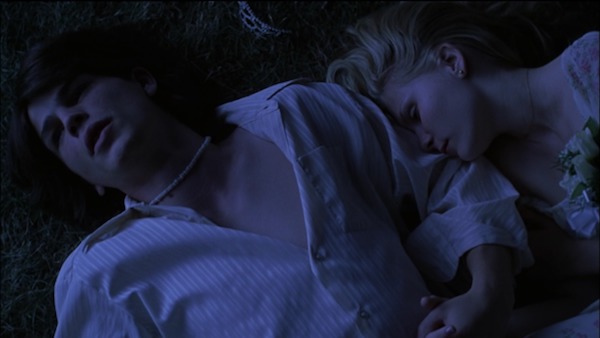While the cult status of Sofia Coppola’s first feature only grew after its release, a key scene between one of the Lisbon sisters and a prom date reveals a crucial turning point for one teen girl’s story. Lauren Pinnington looks back on the insidious chain reaction that comes from neglected affection.
Despite encouragement from her father, the formidable Francis Ford Coppola, and the cast of The Virgin Suicides, Sofia Coppola still felt “really scared” when her first film screened at Cannes in May 1999. She needn’t have been nervous - the director’s debut was warmly received and gained support of critics, but of course, our humility as a sex is instinctive. The Virgin Suicides was released in the US the following year, but disappeared from cinemas as quickly as the Lisbon sisters from their neighbourhood’s vantage. Its cult status, as Coppola has mused, was achieved post-theatrically as the Internet gave it a “second life”. For me, and I’m certain many others of similar age, its impact was made during the throes of adolescence when the VHS was added to my friendship group’s entertainment rotation. The sweep of Kirsten Dunst’s blonde hair and whimsical lettering on the copy’s cover successfully intriguing us on the video rental shelf.
Adapted from Jeffrey Eugenides’ 1993 novel, which Coppola happened upon in her twenties and fell in love with, The Virgin Suicides tells the story of the Lisbons, a middle class catholic family in 1970s Michigan, and the events following the suicide of the youngest of five daughters. Like the book, the film is pieced together from the point of view of a group of voyeuristic local boys who are infatuated with the beautiful teenage sisters – providing a comparable air of appealing mystery about them for the audience. We could project whatever we wanted to onto the girls, claiming Cecilia Lisbon’s dreaminess and proclivity for writing a diary as traits of our own, and commending ourselves for being grown up enough to see a through-line between Lux Lisbon’s trauma and promiscuity.
Movies featuring teenage protagonists were having a post-John Hughes revival in the late 90s / early 00s, and fans devoured smart rom-coms like 10 Things I Hate About You (1999) and horror like the Scream (1996) trilogy, but it felt like we had never seen an art film exclusively for and about us. The soporific cinematography had a strikingly feminine quality - from the pockets of sunlight glittering through trees (a Coppola trademark) on suburban streets, to languid shots of beauty products littering the girls’ bedroom. Our personal identities were forming and we recognised ourselves in every emotional beat of the film’s narrative. We believed in causes, like Cecilia and her passion for animal protection, and fancied ourselves music mavens who felt the same intensity about bands we loved as Lux did, see: when she is forced by the Lisbon matriarch (Kathleen Turner) to destroy all her rock records. We were women in disguise too, whose imagined sense of innate sophistication grew during the malaise of a school day, or as we developed crushes.
There had been examples of teen recklessness before: Tom Cruise’s Joel in Risky Business (1983) transforming his parents house into a brothel, or Ferris Bueller skipping school which results in a day of pratfalls, but these characters were never reprimanded. Even when they were, like the students in The Breakfast Club (1985) who serve detention for their respective wrongdoings, the impact of these punishments are mediocre in comparison to what follows the most crucial scene of The Virgin Suicides.
After convincing the nervous Lisbon parents to let him and a few friends escort the sisters to their school dance, heartthrob Trip Fontaine seizes the opportunity to get his date, Lux, alone. Lux protests, worrying the remainder of their party will leave without them at the end of the evening, only to have Trip reassure her. Naturally, the pair are caught up in the passion and solitude of the moment, their tangled limbs meeting on the football field where Trip boasts of his sporting prowess earlier that day. It’s an unremarkable scenario - lust, the absence of adult supervision, immature decisions. We’ve all got our own similar story - mine involves missing my ride back from a house party in favour of drinking cheap rum only to have to walk miles home across farmland instead. Trip abandons Lux post-coitus - “I didn’t care how she got home”, his present day self reflects - and she calls a cab. Jaded in the backseat, Kirsten Dunst’s eyes vacant, our hearts break for the predictability of her situation and the insidious chain reaction it causes.
Earlier in the film, when teachers at the Lisbon girls’ school discuss the nationwide teenage suicide epidemic and warning signs to look out for, the question of them withdrawing from their peers is posited. It is only following Lux’s failure to return to the familial fold by curfew that this manifests. Buoyed by her grief and a fear that is potentially the result of deeply entrenched religious scaremongering (the family is obviously devout: see the religious iconography the girls decorate their bedrooms with), Mrs. Lisbon takes her daughters out of school, isolating them from the outside world indefinitely. Their futures withering away inside the walls of their home give way to ceaseless, identical days spent in ivory nightgowns staring out of windows with only their beloved mail order travel catalogues as stimulation. It is a dangerous style of parenting, which telegraphs the strength of the bond between the sisters in comparison to their finite relationships with their overbearing mother and passive father.
As Emma Cline notes in her introduction to the novel: [as sampled in The New Yorker] “All the ballast of the suburban world can’t keep the danger away when the source is psychological.” The conversation about mental health was nowhere near as ubiquitous in the 1970s as it is today, and upon recent viewings of The Virgin Suicides, now in my thirties, I’m struck by the notion of what the character arcs might look like today. What if there had been more help and information available? What if Trip Fontaine was only a footnote in the high school chapter of Lux’s life? What if the Lisbon children had been boys instead?
We knew from the beginning that the girls’ lives would end, told that “Cecelia was the first to go”, and the melancholic inevitability of it all as the third act unfurls makes resigning sense. We don’t fault Lux for her indiscretion, which is indicative of any adolescent experience, and she doesn’t go to pieces because the dreamy guy whose charms she was impervious to (while others fawned) ended up ditching her – although she would have every right to. Lux’s composure following the football field incident shows a resilience and strength beyond her 14 years, and after the home incarceration she leaves the boys an anonymous note to deliver to Trip telling him he’s a creep, and she’s over him. The parents’ catastrophic overreaction to their daughter acting her age, and their obliviousness to the irreversible psychological damage the lockdown does, prompts the Lisbon girls to take ultimate action in the most devastating way that one can be in charge of their own narrative.
The Virgin Suicides evokes that feeling of being a teenage girl and in possession of a mind that is “active and dreamy”. The film reminds me of the luxuries of screwing up, when disobeying a parent’s rule or falling in and out of love with the wrong person teaches us lessons and becomes part of our makeup. But it reminds me, most importantly, that it should have been this way for Lux.
Lauren is a writer based in London and her words on pop culture & women have been featured in The Guardian, Bustle and Oh Comely. Find her on Instagram posting pictures of flowers and gin: @laurenpinnington
READ ME is a platform for female-led writing on film commissioned by Girls on Tops. Louisa Maycock (@louisamaycock) is Commissioning Editor and Ella Kemp (@efekemp) is Contributing Editor.




